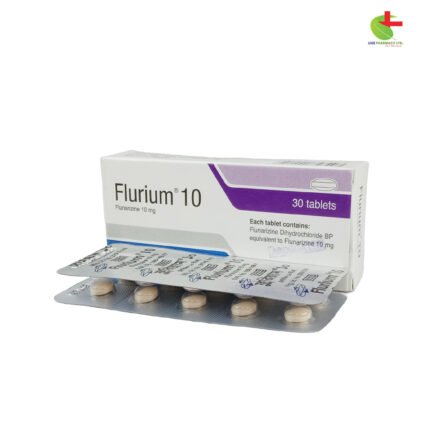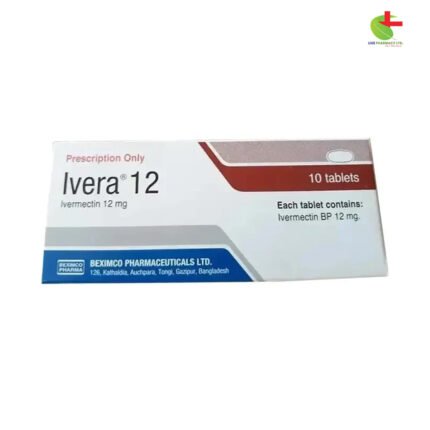Ivera 6
100.00৳ Strip
- Ivera tablets, marketed by Live Pharmacy under Square Pharmaceuticals PLC, treat diverse parasitic conditions: strongyloidiasis, onchocerciasis, filariasis, scabies, and head lice.
- The active ingredient, ivermectin, acts by binding to chloride ion channels in parasite nerve and muscle cells, leading to paralysis and eventual death of the parasites.
- Dosage is tailored to the specific condition: single or multiple doses based on body weight for effective treatment.
- Potential side effects are generally mild; precautions include careful use in pregnant women and those hypersensitive to any component of the product.
 Brand
Brand
|
Beximco Pharmaceuticals Ltd |
|---|---|
 Generics
Generics
|
Ivermectin |
 Type
Type
|
Tablet |
Indications:
Ivera tablet is indicated for the treatment of:
- Strongyloidiasis
- Onchocerciasis
- Filariasis
- Scabies
- Head lice
Strongyloidiasis of the intestinal tract: Ivera is indicated for the treatment of intestinal (i.e., nondisseminated) strongyloidiasis due to the nematode parasite Strongyloides stercoralis. This indication is based on clinical studies of both comparative and open-label designs, in which 64-100% of infected patients were cured following a single 200-mcg/kg dose of Ivera.
Onchocerciasis: Ivera is indicated for the treatment of onchocerciasis due to the nematode parasite Onchocerca volvulus. This indication is based on randomized, double-blind, placebo-controlled, and comparative studies conducted in 1427 patients in onchocerciasis-endemic areas of West Africa. The comparative studies used diethylcarbamazine citrate (DEC-C).
Pharmacology:
Ivermectin selectively binds and with high affinity to glutamate-gated chloride ion channels, which occur in invertebrate nerve and muscle cells, leading to an increase in the permeability of cell membranes to chloride ions with hyperpolarization of the nerve or muscle cell and, ultimately, death of the parasite.
Dosage & Administration:
- For Treatment (If COVIO Positive): 2 Tablets of Ivermectin 6 mg once daily for 5 days (2+0+0 for 5 days).
- For Prophylaxis: Single-dose as mentioned below to be taken on Day 1 & the same dose on Day 7.
- Body Weight 15-24 kg: 1 Tablet of Ivermectin 3 mg
- Body Weight 25-35 kg: 1 Tablet of Ivermectin 6 mg
- Body Weight 36-50 kg: 1 Tablet of Ivermectin 6 mg + 1 Tablet of Ivermectin 3 mg
- Body Weight 51-65 kg: 2 Tablets of Ivermectin 6 mg
- Body Weight 66-79 kg: 2 Tablets of Ivermectin 6 mg + 1 Tablet of Ivermectin 3 mg
- Body Weight >80 kg: 3 Tablets of Ivermectin 6 mg
Interaction:
Post-marketing reports of increased INR (International Normalized Ratio) have been rarely reported when Ivera was co-administered with warfarin.
Contraindications:
It is contraindicated in patients who are hypersensitive to any component of this product.
Side Effects:
- Strongyloidiasis: In clinical studies, adverse reactions related to Ivera included asthenia/fatigue (0.9%), abdominal pain (0.9%), anorexia (0.9%), constipation (0.9%), diarrhea (1.8%), nausea (1.8%), vomiting (0.9%), dizziness (2.8%), somnolence (0.9%), vertigo (0.9%), tremor (0.9%), pruritus (2.8%), rash (0.9%), and urticaria (0.9%).
- Onchocerciasis: Adverse reactions reported included arthralgia/synovitis (19.3%), lymph node enlargement and tenderness, pruritus (27.5%), skin involvement, fever, and ophthalmological reactions.
Pregnancy & Lactation:
Pregnancy Category C. Ivermectin does not appear to be selectively fetotoxic to the developing fetus. However, safety in pregnancy and lactation has not been established.
Precautions & Warnings:
Historical data have shown that microfilaricidal drugs might cause reactions such as the Mazzotti reaction in patients with onchocerciasis. Caution is advised in patients with hyperreactive onchodermatitis (sowda) and Loa loa co-infection.
Use in Special Populations:
- Pediatric Use: Safety and effectiveness in pediatric patients weighing less than 15 kg have not been established.
- Geriatric Use: Clinical studies did not include sufficient numbers of subjects aged 65 and over to determine whether they respond differently from younger subjects.
Therapeutic Class:
Anthelmintic
Storage Conditions:
Keep in a dry place, below 30°C. Protect from light. Keep out of the reach of children.













Reviews
There are no reviews yet.